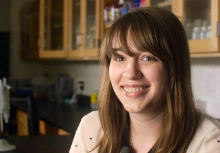College of Science Department of Ecology and Evolutionary Biology (EEB)
When
Where
Environment and Natural Resources 2 Building, Room S107
1064 E. Lowell St., Tucson, AZ 85719
Event Description
Symbiommunity: Characterizing how host-microbe interactions shape cnidarian resilience in a rapidly changing world
Scleractinian corals, which form the structural foundation of vital coral reef ecosystems, are highly symbiotic organisms, reliant on associations with diverse microbiota (collectively termed the “holobiont”). These symbiotic associations play an important role in organismal response and resilience to a variety of stressors including thermal stress and disease. Still many gaps exist in our understanding of coral-microbiota associations and their roles in host fitness. Research in my group aims to understand how associations between cnidarians and their microbial partners (photosymbiotic algae and the microbiome) shapes organismal resilience in a rapidly changing world, with a focus on immunity and disease. We address these questions in a range of study systems, each selected for their unique experimental advantages. Here I will highlight three ongoing projects leveraging different cnidarian study systems to investigate: 1) the immunological consequences of natural variation in host-photosymbiont associations, 2) the impacts of thermal bleaching induced dynamic changes in photosymbiont density on host disease resilience, and 3) the roles of phenotypic plasticity and shifting microbial associations in rapid adaptation to disease. Combined, these studies aim to improve understanding of the factors contributing to coral resilience, and unlock knowledge regarding the future adaptive potential of reef-building corals in a rapidly changing world.
Presenter Details

Dr. Lauren Fuess
Lauren Fuess is an ecological and evolutionary immunologist whose work focuses on understanding the causes and consequences of host-symbiont interaction in diverse systems, including cnidarians. She received her bachelor’s degree in Marine Biology from the College of Charleston in 2012 and then spent the following year conducting invasive species research in Jamaica as a Fulbright Full Grant recipient. In 2018 she received her doctoral degree in Quantitative Biology from the University of Texas at Arlington. Her dissertation focused on ecological immunology of Caribbean corals, including investigation of the impacts of variation in photosymbiont density on host coral immunity. Following completion of her degree, she spent 2 years as a postdoc at the University of Connecticut, partially funded by the American Association of Immunologists. Her postdoctoral work shifted from mutualisms to parasitism, studying evolution of host responses to novel parasites in the stickleback-cestode system. In 2020 she joined the faculty at Texas State University as an Assistant Professor of Biology and established her research group, the Symbiommunity Lab, which investigates symbiosis-immune interplay primarily in cnidarian systems.

